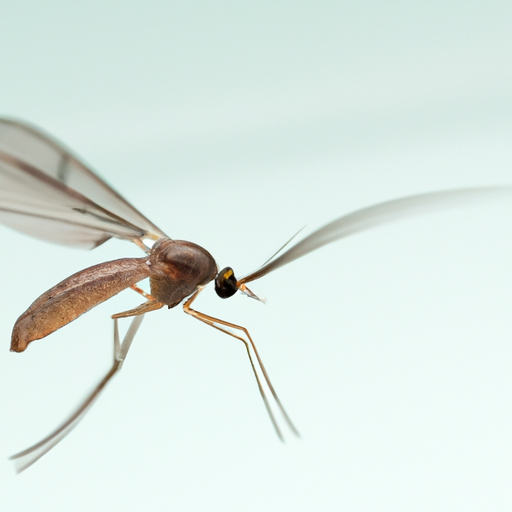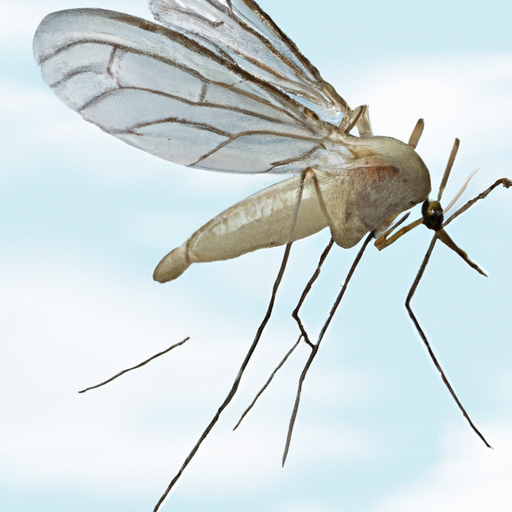
Hello there! In this article, we’ll be discussing five easy ways to get rid of those pesky gnats. We’ll provide you with step-by-step tutorials on how to effectively eliminate these annoying insects from your home. By the end of this read, you’ll have a handful of practical techniques to tackle the gnat problem and restore peace to your living space. Let’s get started!
Table of Contents
5 Easy Ways to Get Rid of Gnats
Gnats can be a frustrating and annoying problem to deal with. These tiny flying insects seem to appear out of nowhere and can quickly become a nuisance in your home and outdoor spaces. Not only are they bothersome, but gnats can also have a negative impact on your health and hygiene. In this article, we will explore why gnats are a problem and provide you with five easy ways to get rid of them effectively.
Identification of Gnats
Before we dive into the solutions, it is important to be able to identify gnats. Gnats are small flying insects that resemble tiny flies, measuring around 1/8 to 1/4 of an inch in length. They often have long legs and wings, and their bodies can be either black or gray. Gnats are attracted to moisture and decaying organic matter, which is why they can often be found near drains, potted plants, and garbage cans.
Common Areas Where Gnats Can Be Found
Gnats are commonly found in areas where moisture and organic matter are present. This includes kitchens, bathrooms, basements, and outdoor spaces with standing water or vegetation. In homes, they can be found near sinks, drains, and houseplants. In gardens, they can be found around compost heaps, decaying plants, and overwatered areas. It is important to be aware of these common areas to effectively target and eliminate gnats.
The Negative Impact of Gnats on Health and Hygiene
Gnats may seem harmless, but they can actually have a negative impact on both your health and hygiene. These tiny insects are known to carry bacteria and other pathogens, which can contaminate your food and surfaces, leading to potential illnesses. Additionally, gnats can be a source of irritation, causing itching and discomfort when they come into contact with your skin or eyes. It is crucial to take action to control and eliminate gnats to maintain a healthy and hygienic environment.
Preventive Measures
Prevention is always better than cure when it comes to dealing with gnats. By implementing these simple preventive measures, you can significantly reduce the likelihood of a gnat infestation in your home or outdoor spaces.
Keeping Your Home Clean and Dry
One of the most effective ways to prevent gnats is by keeping your home clean and dry. Regularly clean up spills, wipe down surfaces, and ensure that there is no standing water in sinks or other areas. Additionally, make sure to keep your garbage cans tightly sealed to prevent gnats from being attracted to food scraps.
Proper Food Storage Techniques
Gnats are attracted to decaying organic matter, including fruits and vegetables. To prevent attracting gnats into your home, store your produce in the refrigerator or in sealed containers. This will eliminate their food source and discourage them from lingering in your kitchen.
Sealing Potential Entry Points
Gnats can enter your home through small cracks and openings. To prevent their entry, it is important to seal potential entry points such as gaps around windows, doors, and utility openings. By doing so, you can create a barrier that will help keep gnats and other pests out of your living spaces.
Using Window Screens and Door Seals
Installing window screens and door seals is another effective way to prevent gnats from entering your home. These physical barriers allow you to enjoy fresh air while keeping unwanted insects out. Make sure to inspect and repair any damaged screens or seals to maintain their effectiveness.

Non-Toxic Methods
If you prefer non-toxic methods to get rid of gnats, there are several options available to you. These methods utilize natural ingredients and are safe for both humans and pets.
Creating Homemade Gnat Traps
One simple and effective method is to create homemade gnat traps. These traps can be made using common household items such as apple cider vinegar or dish soap. For example, fill a shallow dish with apple cider vinegar and add a few drops of dish soap. The scent of the vinegar will attract the gnats, and the dish soap will disrupt the surface tension, causing them to drown in the liquid.
Natural Repellents like Vinegar and Essential Oils
Another non-toxic method is to use natural repellents, such as vinegar and essential oils. Gnats are repelled by the strong scent of these substances. Simply mix equal parts water and vinegar in a spray bottle and use it to mist areas where you have noticed gnats. Alternatively, you can add a few drops of essential oils, such as citronella or lemon eucalyptus, to a spray bottle filled with water and spray it in gnat-infested areas.
Utilizing Sticky Traps
Sticky traps are a convenient and effective way to catch and eliminate gnats. These traps are coated with a sticky substance that gnats get stuck to when they come into contact with it. Place sticky traps near areas where gnats are commonly seen, such as near fruit bowls or potted plants. Replace the traps regularly or when they become full to maintain their effectiveness.
Maintaining Clean Drains and Disposing of Organic Waste Correctly
Gnats are often found near drains and garbage areas, as they are attracted to decaying organic matter. To prevent gnats from breeding and thriving in these areas, regularly clean your drains using a mixture of vinegar and baking soda. Additionally, make sure to dispose of organic waste properly by sealing it in airtight containers or composting it away from your living spaces.
Chemical Solutions
If non-toxic methods are not providing the desired results, chemical solutions can be used to tackle a gnat infestation. It is important to read and follow the instructions on the product labels carefully to ensure safe and effective use.
Introduction to Commercial Gnat Repellents
Commercial gnat repellents are readily available and can be effective in controlling gnats. These products come in various forms such as sprays, powders, or granules. They often contain chemicals that repel or kill gnats on contact.
Sprays and Aerosols for Targeted Gnat Removal
Sprays and aerosols are convenient options for targeted gnat removal. These products can be applied directly to areas with a high concentration of gnats, such as windowsills or door frames. Make sure to spray the product according to the instructions and avoid spraying it near food preparation areas.
Applying Residual Insecticides for Long-Lasting Effects
Residual insecticides are designed to provide long-lasting effects by leaving a residue that continues to repel or kill gnats over time. These products are typically applied to surfaces and can provide extended protection against gnats and other flying insects. It is important to follow the instructions and precautions provided by the manufacturer when using residual insecticides.
Seeking Professional Pest Control Services
If your gnat infestation persists despite your efforts, it may be necessary to seek professional pest control services. Pest control professionals have access to specialized products and techniques to effectively eliminate gnats and prevent future infestations. They can assess the extent of the infestation and tailor a treatment plan specific to your needs.

Biological Control
Biological control methods involve using natural enemies of gnats to reduce their populations. These methods are environmentally friendly and can be used in both indoor and outdoor settings.
Introduction to Beneficial Predators of Gnats
Gnats have natural predators that feed on them, such as birds, bats, and some species of spiders. By attracting and maintaining populations of these beneficial predators in your outdoor spaces, you can naturally control and reduce gnat populations.
Attracting Natural Enemies like Parasitic Wasps
Parasitic wasps are natural enemies of gnats and can be beneficial in controlling their populations. These tiny wasps lay their eggs inside gnat larvae, which then serve as hosts for the developing wasp larvae. You can attract parasitic wasps to your garden by planting flowers that provide nectar and pollen or by providing suitable habitats, such as small bee houses or woodpiles.
Implementing Biological Control Agents like Nematodes
Nematodes are microscopic worms that can be used as biological control agents against gnat larvae. These beneficial organisms can be applied to soil or water, where they will seek out and infect gnat larvae, ultimately leading to their demise. Nematodes are safe for humans, animals, and plants, making them an environmentally friendly option for gnat control.
Gardening Practices
Gardeners often face gnat infestations due to the presence of moist soil and decaying organic matter. By implementing proper gardening practices, you can minimize the conditions that attract gnats and prevent infestations.
Choosing Gnat-Resistant Plants
When selecting plants for your garden, choose varieties that are known to be more resistant to gnats. Certain plants, such as marigolds, lavender, and rosemary, are less appealing to gnats and can help deter them from your garden.
Using Organic and Biological Pest Control Methods in Gardens
Incorporating organic and biological pest control methods in your garden can help reduce gnat populations without the use of harmful chemicals. This includes using beneficial insects, such as ladybugs or praying mantises, to prey on gnats and other pests. Additionally, practicing proper soil and plant care, such as regular watering and timely removal of any decaying plant material, can help create an unfavorable environment for gnats.
Proper Watering Techniques to Prevent Gnat Breeding
Overwatering is a common mistake that can contribute to gnat infestations in gardens. Gnats thrive in moist soil, so it is important to water your plants only when necessary and avoid overwatering. Allow the top few inches of soil to dry out before watering again, as this will minimize the conditions that attract gnats.

Dealing with Persistent Infestations
If you find yourself dealing with a persistent gnat infestation despite your best efforts, it is important to identify the root cause of the infestation and implement targeted treatments.
Identifying the Root Cause of the Infestation
Identifying the root cause of the gnat infestation is crucial to effectively eliminate the problem. Check for any sources of standing water, such as leaky pipes or overwatered plants, and address them. Additionally, inspect areas where organic matter may be present, such as garbage cans or compost heaps, and make sure they are properly sealed or managed.
Implementing Targeted Treatments
Once you have identified the root cause, implement targeted treatments to eliminate gnats. This may include using a combination of the preventive measures, non-toxic methods, or chemical solutions mentioned earlier. Focus your efforts on the areas where gnats are most commonly seen and breeding.
Ongoing Monitoring and Preventive Measures
Even after successfully eliminating a gnat infestation, it is important to continue monitoring your living spaces and implementing preventive measures. Regularly inspect drains, potted plants, and garbage areas to ensure there are no new sources of attraction for gnats. By remaining vigilant and taking immediate action, you can prevent future infestations from occurring.
Common Mistakes to Avoid
While tackling a gnat infestation, it is important to be aware of common mistakes that can hinder your efforts.
Overwatering Plants
Overwatering your plants can create a favorable environment for gnats to thrive. Make sure to water your plants only when necessary and avoid excessive watering, which can lead to soggy soil and promote gnat breeding.
Ignoring Small Gnat Populations
Ignoring small gnat populations may seem harmless, but it can lead to larger infestations over time. It is important to take immediate action when you notice even a few gnats, as they can reproduce rapidly and become harder to control.
Using Excessive Chemical Pesticides
While chemical pesticides can be effective in eliminating gnats, it is important to use them sparingly and according to the instructions provided. Using excessive amounts of pesticides can be harmful to the environment, other beneficial insects, and even your health. Always follow the recommended dosage and precautions when using chemical pesticides.

Tips for Outdoor Spaces
Gnats are not just a problem indoors; they can also be bothersome in outdoor spaces. Here are some tips to create gnat-free zones outdoors:
Creating Gnat-Free Zones in Outdoor Living Areas
To create gnat-free zones in your outdoor living areas, use citronella candles or torches to repel gnats with their strong scent. You can also set up fans, as gnats are weak fliers and will have difficulty flying through the airflow created by the fans. Additionally, consider using outdoor mosquito netting around seating areas to create a physical barrier against gnats and other flying insects.
Proper Waste Management and Cleaning
Proper waste management is essential in outdoor spaces to prevent attracting gnats. Regularly clean up any food scraps or spills, and make sure to securely seal garbage cans and bins. By eliminating potential food sources, you can discourage gnats from congregating near your outdoor spaces.
Utilizing Outdoor Gnat Repellents
Similar to indoor repellents, outdoor gnat repellents can be an effective way to keep gnats away from your outdoor spaces. These repellents often come in the form of sprays or foggers that can be applied to outdoor areas. Make sure to follow the instructions provided and avoid spraying repellents directly on plants or other delicate surfaces.
Conclusion
Dealing with gnats can be a frustrating and persistent problem, but with the right approach, you can effectively get rid of them. By implementing preventive measures, using non-toxic methods, considering chemical solutions when necessary, exploring biological control options, practicing proper gardening techniques, and taking immediate action against persistent infestations, you can successfully eliminate gnats from your living spaces. Remember to avoid common mistakes and utilize tips for both indoor and outdoor areas. Take control of your environment and enjoy a gnat-free living space for you and your family.



